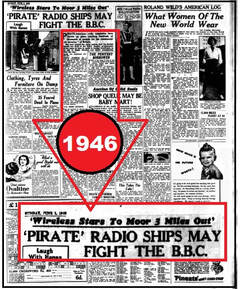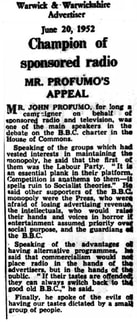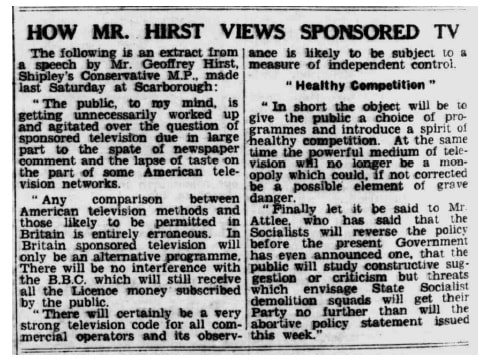|
Prince Charles explains 'pebble theatre'.
|
PEBBLE
|
|
Don Pierson [right] explains how a young Prince Charles made a request to join the Radio London fan club. |
|
|
Prince Charles explains 'pebble theatre'.
|
PEBBLE
|
|
Don Pierson [right] explains how a young Prince Charles made a request to join the Radio London fan club. |
|
|
Pick up any of the many books written about 'pirate radio' and you will discover that they all seem to follow the same formula: most of them claim to review what happened prior to WWII and then most of them skip over the Nineteen Fifties and begin anew with the Nineteen Sixties. So what happened between the end of WWII in 1945, and 1960? Most of these books do not tell you. Another aspect of these books is that they insist upon repeating the myth that the Sixties were "swinging", and that until Radio Caroline came along there was no outlet for pop music. The problem with that scenario, apart, from being 100% false, is that the Beatles owed nothing for their success to Radio Caroline. The Beatles were already a success before Radio Caroline uttered its first emission with a test signal on March 27, 1964! But how can that be? The story (and it is a unified sort of accepted and well-parroted story), is that Radio Caroline changed everything, but in reality, it changed nothing! Neither did Radio London, or any of the offshore stations. The offshore did provide a form of employment for a time to a number of individuals, who later continued to earn a pay check (cheque) from future employment with British Establishment authorized and licensed broadcasting stations. Some went overseas and got employment with licensed stations there. George Saunders once remarked that those offshore personnel who did reasonably well were the highly qualified and skilled engineers, but the djs were not as successful because anyone with the gift of the gab could be a disc jockey. Engineers had years of schooling and specialized training, and they were in demand by many companies and governments. Consequently many of the djs became jealous of them (and showed it) at offshore radio reunions! While the financiers of the offshore stations remained a mystery, there was no bigger mystery than how Radio Caroline got on the air. Yet many of the djs on the offshore stations started to tell embellished stories about the origins of these stations and their impact upon the Nineteen Sixties. Because the financiers remained quiet, no one contradicted the djs, and it was the djs who mainly supplied fodder for the newspapers and the many books that began to appear. After the Sixties came a choppy period in which offshore broadcasting had no real significance to the real world, and the Seventies were followed by the Eighties, in which for a brief moment; mainly in the southeast of England, interest was generated both for and against in the sounds generated by offshore broadcasting. Finally the Nineties saw the lid go on British offshore broadcasting, and this was followed by a handful of enthusiasts who evolved into a ship preservation group. Much later they succeeded in getting a license from the British government for a low-power community radio license for a station they called 'Radio Caroline'.  Now this is where a string of books culminated in Paul Rusling's plagiarized pages which is endorsed by that same, licensed, very small, low-power, community radio station which calls itself 'Radio Caroline'. Really, that is what the Rusling book is all about. He tries to draw a timeline from the birth of broadcasting until today, but he also skips over everything that happened after World War II was declared, until a smattering of noises about offshore radio began to be heard during the early Sixties. A lot of the material he used came from research conducted and paid for by 'The Trio'.  However, as I pointed out yesterday with that 1944 newspaper headline, there was talk of breaking the BBC monopoly in sound broadcasting as soon as WWII ended. Then, the year after WWII ground to a halt, this headline appeared [see picture right] in the same newspaper during 1946. Although these were the years prior to the dawn of British commercial television, these newspaper stories were about British commercial radio, and ITV was not the point of discussion! This was all about sponsored commercial radio and these reports had American overtones that reached back to the days when American Forces Radio stations were set up on bases throughout the British Isles. That was prior to D-Day. So if all this American interest was being shown, who was on the British side of this theme?  If you have heard of Christine Keeler, it is possible that you have heard of John Profumo who became Minister of War in the government of Tory Prime Minister Harold Macmillan. But back in 1952, John Profumo was also waving the flag for the introduction of sponsored commercial radio. Profumo was not alone among Tory MPs. Geoffrey Hirst who represented Shipley, in Yorkshire, was also a member of this group. In 1953 he was in Scarborough addressing the issue of commercial television. But by 1959, Hirst had registered a major company called Radio Yorkshire (Development) Company Ltd. That company created a spin-off several years later, and its aims and ambitions were to ignore licensing and go offshore. That 'pirate' approach was squelched by the Hirst group, and Don Robinson's venture had to change its name to Radio 270.  While the pre-WWII stations in Captain Plugge's IBC network had built quite a following until the beginning of the WWII, the opportunity to repeat that plan of action after the War was closed off. The problem arose when most of their host nations came to owe their liberation in large part to the sanctuary of safety that the British Crown offered their governments in exile during the War. Of the countries that really mattered, only Luxembourg evolved into creating a renewed problem for the British Crown, and its agency, the GPO, which had licensed the BBC. While Captain Plugge's broadcasting network may have been put out of operation, his IBC studios were not, and they became an asset employed by Allan Crawford to make his cover versions of hit records. On the other hand, after the closure of the English language commercial stations on the European continent, the J. Walter Thompson studios at Bush House became redundant. They were sold off to that murky entity that became known as the BBC World Service. It was a 'front' for another entity hiding in obscurity behind the mantle of the British Foreign Office, which itself was heavily tied into the sinister worlds of MI5 and M16. Collectively they were known as the Secret Intelligence Services (SIS). It was the SIS which had a big part in helping to create the Office of Strategic Services (OSS) for the USA, which in a later incarnation became the Central Intelligence Agency (CIA). Churchill's wartime directives also led to the emergence of the British commandos and the template for their success eventually led to a U.S. version called the Green Berets. There were a lot of people from both sides of the Atlantic who had been milling around in London during WWII, and inevitably geopolitical ideas were also in circulation and in combat with commercial interests. Charles Orr Stanley was a Protestant from the Republic of Ireland who straddled the broken fence on the island of Ireland which separated Irish Republicans from British monarchists. He built large industries on both sides of the Irish border and maintained a headquarters in Cambridge, England. His various companies formed a core enterprise known as the Pye Group of Companies, and Pye became recipients of civilian and military contracts paid for by British taxpayers. Tomorrow I will explain how Charles Orr Stanley began to bring together all of the interested parties and launched a campaign that lasted through the Fifties and into the Sixties which eventually resulted in the creation of Radio Caroline. Comments are closed.
|
Our team produced this free radio program for PCRL in Birmingham.
It was repeatedly broadcast on and after October 20, 1985. Click & listen! Blog Archive
August 2023
Copyright 2021 with all rights reserved.
|
Index |
Library |
|
